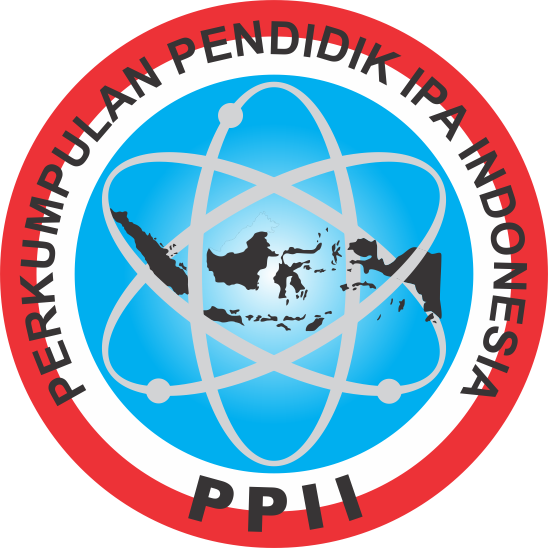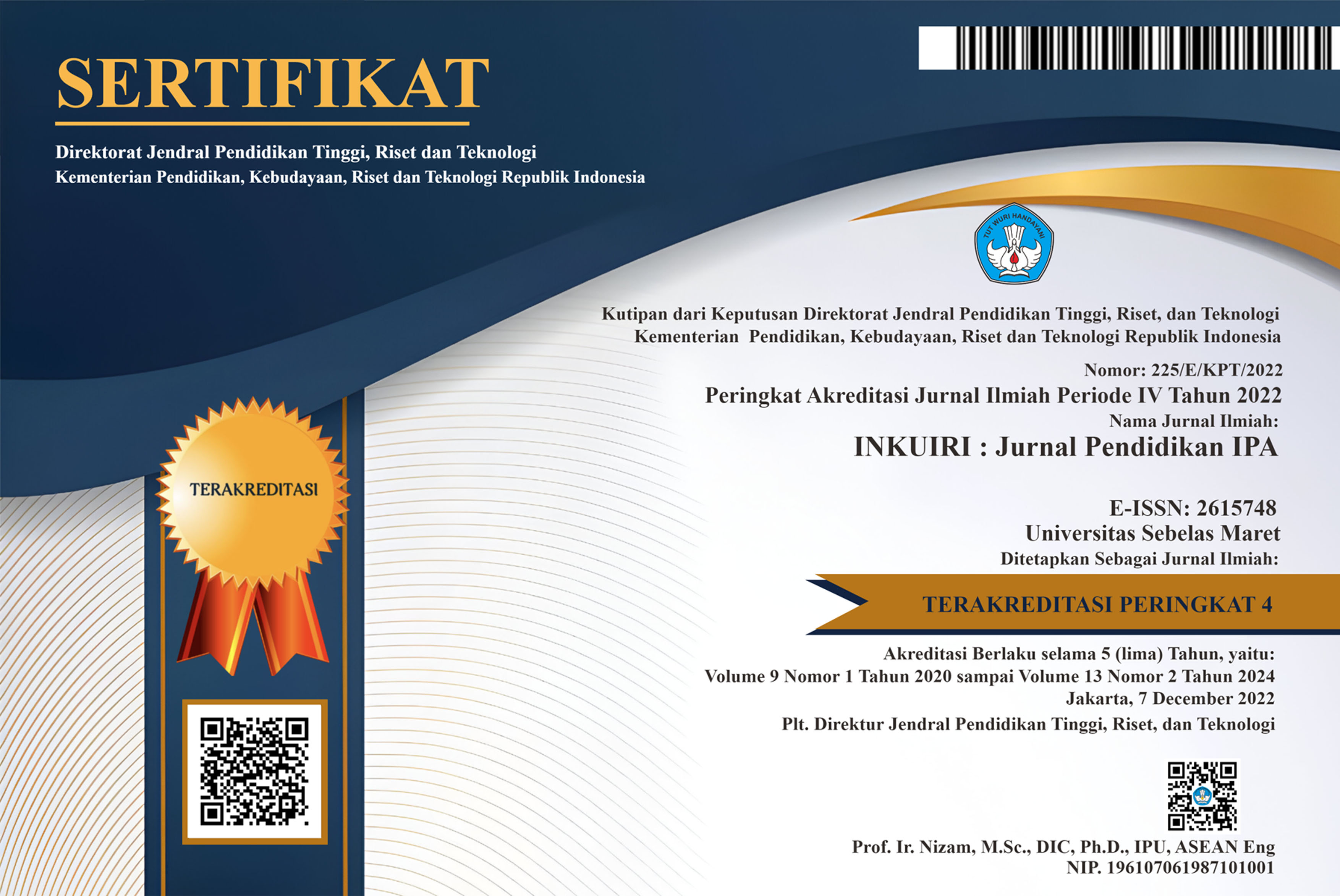EFEKTIVITAS MODUL ELEKTRONIK BERBASIS SAINTIFIK PADA MATERI KELARUTAN DAN HASIL KALI KELARUTAN UNTUK MENINGKATKAN KETERAMPILAN PROSES SAINS SISWA SMA
Abstract
Penelitian ini bertujuan untuk mengetahui keefektivitasan modul elektronik berbasis saintifik pada materi kelarutan dan hasil kali kelarutan untuk meningkatkan keterampilan proses sains siswa SMA. Penelitian keefektifan modul elektronik berbasis saintifik ini didahului dengan penelitian pengembangan (RnD) terlebih dahulu dengan jenis penelitian yang digunakan yaitu model pengembangan media yang mengacu pada teori Borg dan Gall dengan langkah-langkah yaitu, 1) penelitian dan mengumpulkan informasi, 2) merencanakan, 3) mengembangkan bentuk awal produk, 4) uji lapangan awal, 5) Rrevisi produk utama, 6) uji lapangan utama, 7) revisi produk operasional, 8) uji lapangan operasional, 9) revisi produk akhir, dan 10) diseminasi. Uji efektifitas produk modul elektronik dilaksanakan pada bagian revisi produk akhir. Sumber data pada penelitian ini berasal dari siswa SMAN 1 Teras. Subjek penelitian yang digunakan adalah 68 siswa dengan rincian masing-maing 34 siswa dari kelas XI MIA 2 dan XI MIA 3.Teknik penelitian yang digunakan adalah observasi. Observasi keterampilan proses sains dilakukan oleh tiga observer. Teknik analisis data yang digunakan adalah analisis deskriptif kualitatif dan kuantitatif. Hasil uji statistik menunjukkan ada perbedaaan nilai keterampilan proses sains (KSP) antara kelas kontrol dan eksperimen sehingga modul elektonik berbasis sainstifik ini efektif digunakan dalam pembelajaran guna memberdayakan keterampilan proses sains siswa.
This study aims to determine the effectiveness of scientific-based electronic modules on solubility and solubility product materials to improve science process skills of high school students. Research on the effectiveness of this scientifically based electronic module was preceded by development research (RnD) first with the type of research used, namely the media development model that refers to the Borg and Gall theory with steps, namely, 1) research and collecting information, 2) planning, 3 ) developing the initial form of the product, 4) initial field test, 5) main product revision, 6) main field test, 7) operational product revision, 8) operational field test, 9) final product revision, and 10) dissemination. The test of the effectiveness of the electronic module product is carried out in the revision of the final product. Sources of data in this study came from students of SMAN 1 Teras. The research subjects used were 68 students with details of 34 students from class XI MIA 2 and XI MIA 3. The research technique used was observation. Observations of science process skills were carried out by three observers. The data analysis technique used is descriptive qualitative and quantitative analysis. The results of the statistical test showed that there was a difference in the value of science process skills (KSP) between the control and experimental classes so that this scientifically based electronic module was effectively used in learning to empower students' science process skills.
Keywords
Full Text:
PDFReferences
Dahar, R.W. 2011. Teori-teori Belajar dan Pembelajaran. Yogyakarta: Erlangga.
Feyzioglu, B. 2009. “An Investigation of the Relationship between Science Process Skills with Efficient Laboratory Use and Science Achievement in Chemistry Education.” Turkish Science Education 6(3): 114–32.
Guritno, T.A., Masykuri,M., dan Ashadi. 2015. “Pembelajaran Kimia Melalui Model Pemecahan Masalah dan Inquri Terbimbing Ditinjau dari Keterampilan Proses Sains (KPS) Dasar dan Sikap Ilmiah Siswa.” Jurnal Inkuiri 4(2): 1–9.
Holbrook, J. 2005. “Making Chemistry Teaching Relevant.” Chemical Education International 6(1): 3–8.
Johnstone, A. H. 1991. “Why Is Science Difficult to Learn? Things Are Seldom What They Seem.” Journal of Computer Assisted Learning 7(2): 75–83.
Karamustafaoğlu, S. 2011. “Improving the Science Process Skills Ability of Science Student Teachers Using I Diagrams.” Eurasian J. Physic. Chem. Education 3(1): 26–38. http://www.eurasianjournals.com/index.php/ejpce.
Kemendikbud. 2014. Permendikbud RI Nomor 104 Tahun 2014 Tentang Penilaian Hasil Belajar oleh Pendidik pada Pendidikan Dasar dan Pendidikan Menengah.
Osman, K., dan Vebrianto, R. 2013. “Fostering Science Process Skills and Improving Achievement through the Use of Multiple Media.” Journal of Baltic Science Education 12(2): 191–204.
Pekdağ, B. 2010. “Alternative Methods in Learning Chemistry: Learning with Animation, Simulation, Video and Multimedia.” Journal of Turkish Science Education 7(2): 111–18. http://www.tused.org/internet/tused/archive/v7/i2/text/tusedv7i2a5.pdf.
Sukarno, S. 2014. “Improving Science Process Skills (SPS) Science Concepts Mastery (SCM) Prospective Student Teachers Through Inquiry Learning Instruction Model by Using Interactive Computer Simulation.” International Journal of Science and Research (IJSR)3(2): 6–9.
Van Deursen, Alexander J.A.M., Colin L. B, Sabrina M. H, dan Piet A.M. K. 2015. “Modeling Habitual and Addictive Smartphone Behavior: The Role of Smartphone Usage Types, Emotional Intelligence, Social Stress, SelfRegulation, Age, and Gender.” Computers in Human Behavior 45: 411–20.
Zeidan, A. H. and Jayosi, M. R. 2015. “Science Process Skills and Attitudes toward Science among Palestinian Secondary School Students.” World Journal of Education 5(1): 13–24. https://files.eric.ed.gov/fulltext/EJ1158460.pdf.
Refbacks
- There are currently no refbacks.






